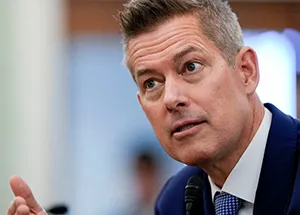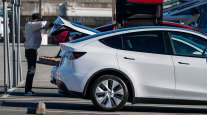Senior Reporter
Trump Takes Aim at EV Policies With New Energy Order

[Stay on top of transportation news: Get TTNews in your inbox.]
WASHINGTON — President Donald Trump in his first moments back in the White House signed an executive order meant to advance domestic oil and gas production and halt programs enacted during the Biden administration that aimed to boost adoption of electric and alternative-fuel vehicles.
The “Unleashing American Energy” executive order Trump signed Jan. 20 took specific aim at the Inflation Reduction Act and the Infrastructure Investment and Jobs Act, Biden-era laws focused primarily on addressing effects related to climate change and rebuilding and modernizing deteriorating infrastructure, respectively.
Congressional Republican leaders cheered the executive order — among the president’s first official acts — insisting that comprehensive budget and tax legislation also will clear the chambers within the Trump administration’s first 100 days.
The executive order’s objective is to withdraw federal support for electric vehicle programs and ramp up energy production in federally managed jurisdictions. According to the order, the Trump administration is “terminating, where appropriate, state emissions waivers that function to limit sales of gasoline-powered automobiles; and by considering the elimination of unfair subsidies and other ill-conceived government-imposed market distortions that favor [electric vehicles] over other technologies and effectively mandate their purchase by individuals, private businesses, and government entities alike by rendering other types of vehicles unaffordable.”
We will lower prices.
We will export American energy.
We will put an end to the Green New Scam.
We will revoke the EV mandate.pic.twitter.com/PEnFL9ZjyQ — Donald Trump HQ 🇺🇸 (@Trump47thEra) January 20, 2025
The executive order specifically directs a pause in funding for assisting state agencies to build electric vehicle charging stations.
One section of the order is called “Terminating the Green New Deal,” a reference to an aspirational policy proposal advanced by progressive Democrats during Trump’s first term that took aim at a wide swath of environmental issues. Selected elements of this proposal became law in the IIJA.
The White House said Trump “will unleash American energy by ending Biden’s policies of climate extremism, streamlining permitting, and reviewing for rescission all regulations that impose undue burdens on energy production and use, including mining and processing of non-fuel minerals.”
The Trump administration also indicated that the president would “declare an energy emergency and use all necessary resources to build critical infrastructure,” adding that Trump’s energy actions would “empower consumer choice in vehicles.”
On Capitol Hill, Trump’s executive orders garnered overwhelming support from congressional Republicans, many of whom pledged to fulfill the president’s entire legislative agenda.
“Republicans are hard at work on our legislative priorities,” said Senate Majority Leader John Thune (R-S.D.) on Jan. 20. “Among other things, we’re focused on extending tax relief for American families, lifting burdensome Biden administration regulations, building up our military, and securing our border.”
“You’re going to have the Senate Republicans and House Republicans working together to advance the America First agenda, and we will deliver now. The [president] wasted no time either,” said Speaker Mike Johnson (R-La.), who applauded Trump’s array of executive orders about immigration security, climate change, diversity education and training, environmental justice, artificial intelligence and the federal workforce, among others.

Sean Duffy awaits a floor vote on his confirmation to lead Transportation. (Kent Nishimura/Bloomberg News)
This month, Senate leaders have focused on advancing Trump’s Cabinet nominees. The Commerce Committee recently gave approval to former Rep. Sean Duffy’s nomination to lead the U.S. Department of Transportation. The nominee awaits a floor vote on his confirmation. If confirmed, he would succeed Secretary Pete Buttigieg.
“Rep. Duffy comes to the Department of Transportation at a pivotal moment,” said Commerce Committee Chairman Ted Cruz (R-Texas) on Jan. 22. “In aviation, the [Federal Aviation Administration] confronts a persistent shortage of air traffic controllers as it works to instill a culture of safety across the industry.
“On the roads, President Trump has moved to stop costly and unpopular electric vehicle mandates so every American can buy the car of his or her choice. Meanwhile, across all sectors, the department faces the rise of emerging technologies like unmanned drones and self-driving cars, which bring both opportunities and challenges,” Cruz added.
Sen. Maria Cantwell (D-Wash.), the panel’s ranking member, also applauded the nominee’s credentials. As she put it, “During our hearing last week, Mr. Duffy, and in subsequent meetings, has had the opportunity to talk about the many things that are important, not just to my state, but to the nation on [building] a strong and resilient transportation network that allows us to compete in a global economy.”
As they await action on the Senate floor, Minority Leader Chuck Schumer (D-N.Y.) directed his caucus to press Cabinet nominees specific to the president’s policy vision for the economy as well as the social safety net.
Want more news? Listen to today's daily briefing above or go here for more info
“President Trump promised an agenda that will fight for the working and middle class. He promised a golden age for the country. But actions speak louder than words, and so far the president’s nominees suggest that if there’s any golden age coming, it’s only one for the very, very elite,” Schumer said.
The Minority Leader continued, “Democrats will continue to get the president’s nominees on the record on these very important questions: Will Donald Trump’s nominees focus on cutting costs, or will they be more interested in cutting sweetheart deals for big businesses? Will they protect our communities, or will they focus more on protecting special interests?”




